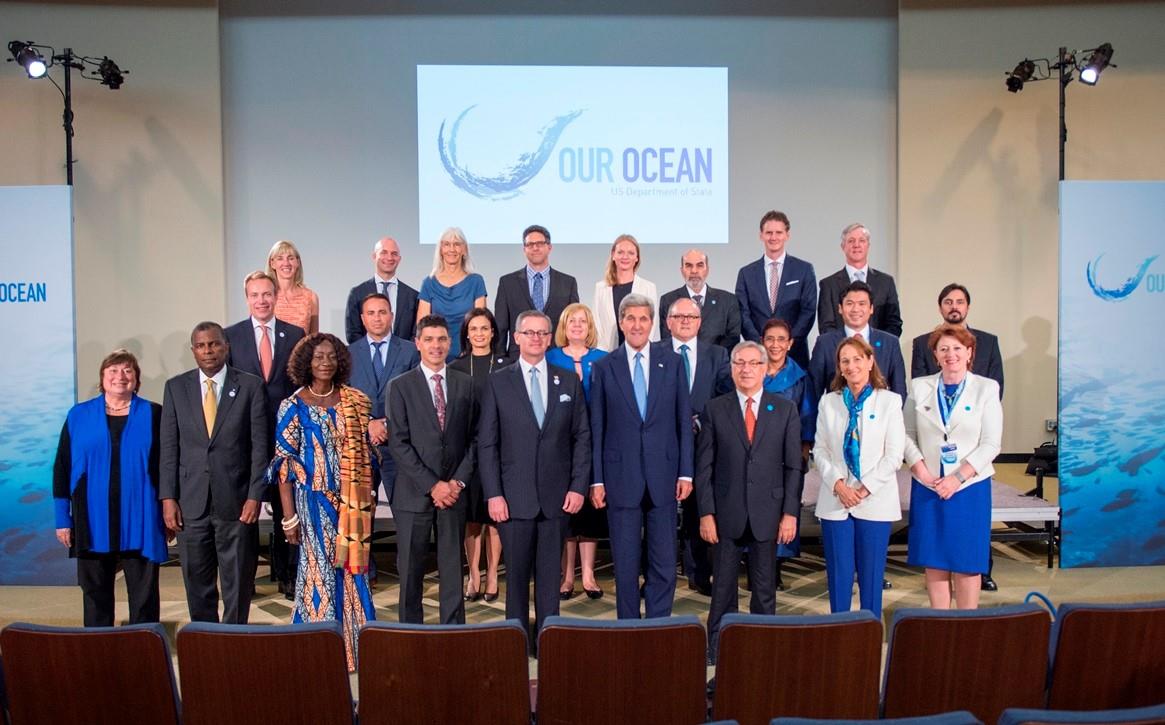In the fight against rogue fishing, everyone must be on board
Our Ocean summit welcomes progress with FAO-brokered treaty

US Secretary of State John Kerry with leaders at Our Ocean 2016.
©Photo: [State Department photo/ Public Domain]
Washington, 16 September 2016 - An international conference on how to achieve healthy and sustainable oceans has welcomed the growing support for a ground-breaking FAO-brokered international accord on illegal fishing.
The Agreement on Port State Measures to Prevent, Deter and Eliminate Illegal, Unreported and Unregulated Fishing (PSMA), is the fruit of years of intense negotiations. It finally came into force in June.
US President Barack Obama, addressing the Our Ocean conference in Washington underscored the need to "act boldly" to address the growing threat posed by a number of current events.
These include dangerous changes in our climate, caused mainly by human activity; dead zones in our ocean, caused mainly by pollution that we create here on land; unsustainable fishing practices; and unprotected marine areas, in which rare species and entire ecosystems are at risk.
Describing it as an "encouraging" signal by world governments, US Secretary of State John Kerry praised progress made with the PSMA. While in 2014 there were only 10 parties to the legally binding PSMA, the number now stands at 36 - 35 countries plus the European Union, acting on behalf of its 28 member states.
When ordering seafood at a restaurant the menus don't specify some stark facts: that a third of the world's fish stocks are overfished and that nearly all the rest are being fished to the absolute maximum, Kerry told conference participants.
Moreover, illegal, unreported and unregulated fishing (IUU) costs the world tens of billions of dollars a year and, as the US Secretary of State underscored, such activities are often linked to "gross human rights violations". "Fishing vessels operating lawlessly...sometime rely on slave labour to obtain bigger catches and larger profits," he added.
Under the PSMA parties designate specific ports for use by foreign vessels, making control easier. Those ships must request permission to enter ports ahead of time, and provide local authorities with information, including on the fish they have on board, and allowing inspection of their log book, licences, fishing gear and actual cargo, among other things.
Importantly, the treaty calls on countries to deny entry or inspect vessels that have been involved in IUU fishing, and to take necessary action. To support this, the PSMA also includes the obligation for parties to share information regionally and globally, regarding any vessels discovered to be involved in IUU fishing.
The PSMA applies to any use of a port, so even vessels that are just refuelling will have to comply with inspection requirements.
At the Our Ocean conference FAO Director-General José Graziano da Silva lauded the countries that have signed the treaty and invited others to follow suit and to come "on board", adding: "We must now focus on ensuring its strong and effective implementation."
"Otherwise," he warned, "rogue fishing vessels will continue to find ways to land and introduce their illegal catches into markets."
"Let's not allow any port state in the world to be known as a shelter for non-compliance amid our efforts to combat illegal fishing," Graziano da Silva said.
In some cases, developing coastal countries and Small Island Developing States, which often host some of the world's most attractive fishing areas, face difficulties in implementing the PSMA, a fact which FAO intends to address.
Graziano da Silva told Our Ocean conference participants that FAO has launched a global program to support the implementation of the PSMA and complementary instruments. This includes the Voluntary Guidelines for Flag State Performance to combat IUU fishing.
This FAO program is focused on policy, legal and technical assistance and capacity building. It will be implemented through a number of national and regional projects in collaboration with international partners.
To carry out this work FAO has so far secured $5 million, including funding from its own resources.
FAO is also collaborating with Google to develop new platforms and research methodologies to support countries in improving their monitoring, control and surveillance of fishing activities.
Contact
Peter Mayer FAO News and Media (Rome) (+39) 06 570 53304 [email protected]
